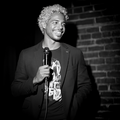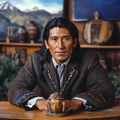Late night television in Nouvelle Alexandrie
Late-night television in Nouvelle Alexandrie refers to broadcast programming that airs during the late evening and early morning hours, typically starting between 22:30 and 00:00 and continuing until 01:30 or 02:00. This television format has evolved into a significant cultural institution since the early days of broadcasting in both Alduria and the Wechua Nation, later developing its own distinctive characteristics after the formation of the Federation in 1685 AN.
Late-night programming is characterized primarily by talk shows, comedy and variety programs, political satire, entertainment news, and intellectual discussion formats. These shows typically feature a host who delivers an opening monologue, conducts celebrity interviews, showcases musical or comedy performances, and engages in topical comedy sketches. Discussion-based formats featuring panels of experts debating contemporary issues have also become an important subset of late-night programming. The format has become an important cultural touchstone in New Alexandrian society, often serving as a platform for political commentary, celebrity promotion, and emerging comedy talent.
History
Late-night television in Alduria began in 1674 AN with the premiere of "After Hours" on the National Aldurian Broadcasting Corporation, hosted by comedian Victor Montoya. The show established many conventions that would define the format, including an opening monologue, celebrity interviews, and musical performances. In the Wechua Nation, late-night programming developed slightly later with "Parap After Dark" debuting in 1678 AN on the newly established national broadcaster, featuring host Tupac Yupanqui.
Following the Federation in 1685 AN, both programs continued to air in their respective regions while gradually incorporating elements from each other's cultural traditions. This cross-pollination laid the groundwork for the diverse late-night landscape that would develop in the years to come.
Golden Era (1685-1710)
The post-Federation period saw a rapid expansion of late-night offerings across multiple networks. The newly formed National Broadcasting Corporation (NBC) launched its flagship late-night program "After Midnight" in 1686 AN, hosted by Sebastian Vega, which quickly became the standard-bearer for the format. The show's success prompted competing networks to develop their own late-night offerings.
A significant innovation during this period was the premiere of "Open Forum" on Lyrica Broadcasting Service in 1691 AN. Unlike traditional host-centered talk shows, "Open Forum" featured a rotating panel of intellectuals, artists, politicians, and public figures engaged in unscripted discussion of controversial topics, often continuing late into the night. The program, which aired live without commercial interruptions between midnight and 2:00 AM, quickly developed a cult following among educated viewers and established a new subgenre of late-night television focused on serious intellectual discourse rather than entertainment.
During this period, several iconic hosts emerged who would define late-night television for a generation:
- Sebastian Vega (NBC's "After Midnight", 1686 AN-1702 AN)
- Elena Mendoza (CBC's "The Late Show", 1688 AN-1707 AN)
- Jaime Perez (AlexTV's "Nightcap", 1689 AN-1704 AN)
- Tupac Yupanqui (WechuNET's "Midnight in Parap", 1685 AN-1699 AN)
- Catherine Laurent (LBS's "Open Forum", 1691 AN-1706 AN)
-
Elena Mendoza (CBC's "The Late Show")
-
Sebastian Vega (NBC's "After Midnight")
-
Tupac Yupanqui, (WechuNET's "Midnight in Parap")
-
Catherine Laurent (LBS's "Open Forum")
The competing shows developed distinctive styles while following the same basic format. Vega's "After Midnight" emphasized political satire and intellectual humor, while Mendoza's "The Late Show" focused more on celebrity interviews and entertainment news. Perez's "Nightcap" became known for its irreverent comedy and risqué content, while Yupanqui's "Midnight in Parap" incorporated elements of traditional Wechua cultural performance alongside contemporary humor. Laurent's "Open Forum" took a completely different approach, eschewing comedy for deep intellectual engagement with complex social and political issues.
Modern Evolution (1710-Present)
The 1710 ANs saw a significant shift in late-night television with the introduction of more diverse hosts and formats. The major breakthrough came in 1711 AN when Sophia Rodriguez became the first woman to host a major network late-night show on NBC, breaking the previously male-dominated landscape. Her program, "Tonight with Sophia," introduced a more conversational interview style and expanded political commentary.
The discussion-based format pioneered by "Open Forum" evolved into more specialized programs. Education Channel's "The Midnight Exchange" (1716 AN-present) adopted the panel format but focused exclusively on academic discourse, while Cortes Federales Parliamentary Channel's "After Hours Debate" (1719 AN-present) specialized in political analysis and featured sitting Deputies from across the political spectrum.
The 1720 ANs witnessed the rise of late-night comedy duos, with shows like CBC's "After Hours" featuring the team of Carlos Jimenez and Maria Flores, who alternated hosting duties and frequently appeared in each other's segments. This period also saw the emergence of specialized late-night programming targeting specific demographics, such as WechuNET's youth-oriented "Generation Next" and AlexTV's culturally-focused "Alexandrian Tonight."
The digital revolution of the 1730 ANs transformed late-night television, with shows developing strong online presences through viral video segments, social media engagement, and streaming platforms. Interflix's digital-first program "Night Shift," launched in 1738 AN, pioneered a format designed specifically for multi-platform consumption, with shorter segments optimized for online sharing while maintaining the traditional late-night structure.
Format and Structure
Most late-night shows in Nouvelle Alexandrie follow similar formats while maintaining distinctive elements, broadly falling into two main categories: entertainment-focused talk shows and panel-based discussion programs.
Talk Show Format
Opening
- Theme music and announcer introduction: Shows typically begin with signature theme music and an announcer introducing the host and that night's guests.
- Opening monologue: The host delivers topical jokes about current events, politics, and popular culture, typically lasting 8-12 minutes.
Main Program
- Comedy segments: Pre-recorded or live sketches, often satirizing current events or pop culture.
- Desk pieces: The host performs comedy bits or commentary while seated at their desk, sometimes with supporting cast members.
- Celebrity interviews: Conversations with actors, musicians, politicians, and other public figures promoting their work.
- Musical or comedy performances: Live performances by musicians or stand-up comedians.
Discussion Panel Format
Opening
- Theme music and announcer introduction: Brief introduction of the night's topic and panel participants.
- Moderator introduction: The moderator outlines the subject of the evening's discussion and establishes ground rules.
Main Program
- Panel discussion: Extended, uninterrupted conversation between experts, typically without commercial breaks.
- Audience participation: Some shows incorporate questions from studio audience or submitted via digital platforms.
- Final statements: Participants typically provide closing thoughts on the subject.
Regional Variations
While following these general structures, late-night shows across different regions of Nouvelle Alexandrie incorporate distinctive elements:
- Aldurian shows typically emphasize political satire and intellectual humor, with longer interview segments.
- Wechua programs often integrate traditional cultural elements and multilingual comedy, with performers occasionally using both Wechua and Alexandrian languages.
- Lyrican productions are known for their emphasis on musical performances, arts coverage, and intellectual discussion formats.
- Santanderian formats incorporate more audience participation and street comedy.
Major Late-Night Programs
Current Shows
| Show | Network | Host(s)/Moderator | Premiere | Format/Style | Notable Features |
|---|---|---|---|---|---|
| "Tonight in the Federation" | NBC | Marco Valerio | 1731 AN | Traditional late-night talk | Political satire, "Federation Pulse" segment featuring person-on-the-street interviews |
| "The Nightly Hour" | CBC | Isabella Dominguez | 1727 AN | Variety/talk | Strong emphasis on musical performances, "Deep Dive" extended interviews with cultural figures |
| "After Hours" | AlexTV | Gabriel Santiago | 1722 AN | Comedy-focused talk | Elaborate comedy sketches, frequent use of supporting cast |
| "Midnight Circle" | WechuNET | Ana Kusi Qhapaq | 1735 AN | Cultural talk show | Bilingual format, traditional Wechua musical performances, political commentary |
| "Metropolitan Late Night" | Metropolis Television | Joaquin Reyes & Sofia Mendez | 1729 AN | Urban-focused variety | Celebrity game segments, street comedy, urban culture focus, nightlife |
| "The Late Debate" | Lyrica Broadcasting Service | Richard Laurent | 1733 AN | Political talk/variety | Extended political interviews, satirical news segments |
| "Night Shift" | Interflix | Carlos Ortega | 1738 AN | Digital-first format | Interactive segments, audience participation via social media, shorter segmented format |
| "Evening Standard" | Education Channel | Rotating academics | 1734 AN | Educational late-night | Intellectual discussions, academic guests, cultural analysis |
| "Capital After Dark" | Cortes Federales Parliamentary Channel | Elena Vasquez | 1736 AN | Political talk | In-depth political interviews, parliamentary analysis, policy debates |
| "Sunset Boulevard" | Entertainment One | Ricardo Montero | 1737 AN | Celebrity-focused | Extended celebrity interviews, behind-the-scenes entertainment coverage |
| "Open Dialogue" | Nouvelle Alexandrie Media Corporation | Sofia Beaumont | 1732 AN | Panel discussion | Live, unscripted intellectual discussions on controversial topics with rotating expert panels, no commercial breaks, runs past scheduled end time when discussions warrant |
Historical Significance
Late-night hosts have emerged as influential political commentators, particularly during election seasons and times of national crisis. The format of comedic commentary has allowed hosts to address sensitive political topics through humor, often making complex issues more accessible to mainstream audiences.
Panel discussion shows like "Open Dialogue" have provided a forum for in-depth exploration of complex political and social issues outside the constraints of commercial television, often featuring voices and perspectives rarely heard in mainstream media.
The Spring Crisis of 1739 marked a pivotal moment for late-night television, as hosts across networks abandoned their usual partisan differences to present a unified defense of democratic institutions. Marco Valerio's emotional monologue on NBC's "Tonight in the Federation" received particular acclaim for balancing humor with genuine patriotic sentiment, while the panel on "Open Dialogue" conducted a seven-hour special session analyzing the constitutional implications of the crisis that continued broadcasting until 5:00 AM.
Cultural Integration
Late-night shows have served as important vehicles for cultural integration within the Federation. Programs frequently feature guests and content from various regional and ethnic backgrounds, helping to foster a shared national identity while celebrating cultural diversity.
Talent Development
The format has proven to be an important launching pad for comedy writers and performers. Many of the Federation's most prominent comedians and actors began their careers as writers or performers on late-night shows. Networks like YouthStream and WechuNET have developed specific late-night formats aimed at showcasing emerging talent from underrepresented communities. Discussion-based programs have similarly provided platforms for emerging intellectuals, academics, and cultural commentators to reach wider audiences than traditional academic or political institutions would allow.
Viewership and Demographics
Late-night television viewership in Nouvelle Alexandrie has evolved significantly in the digital age. According to the 1740 AN National Media Consumption Survey:
- Traditional broadcast viewership averages 32 million nightly viewers across all late-night programs;
- Digital and streaming platforms add approximately 24 million viewers who watch full episodes;
- Short-form clips on social media and video platforms reach an additional 45 million weekly viewers;
- Discussion-format programs like "Open Dialogue" attract smaller but more engaged audiences, averaging 3.2 million viewers but with significantly higher retention rates and longer viewing sessions.
Demographically, late-night audience trends include:
- Traditional broadcast viewers skew older (average age 48)
- Streaming viewers are predominantly younger (average age 31)
- Panel discussion programs attract more educated viewers (68% with university degrees)
- Urban areas show higher viewership rates than rural regions
- Educational attainment correlates positively with late-night viewership
Late-Night Networks
Several networks in Nouvelle Alexandrie have developed specific late-night blocks with distinctive branding. These branded blocks typically include a flagship talk show followed by comedy programming, news recaps, and specialized content.
- NBC's "After Dark" programming block (11:00 PM - 2:00 AM);
- CBC's "Night Owl" lineup (10:30 PM - 2:30 AM);
- AlexTV's "Midnight Zone" (11:30 PM - 3:00 AM);
- WechuNET's "Tuta Pacha" (Night Time) block (10:00 PM - 2:00 AM);
- NAMC's "Late Dialogue" block (11:30 PM - 3:30 AM), featuring panel discussions on contemporary issues.
Social and Cultural Impact
Political Discourse
Late-night comedians have become important political commentators, often using humor to address complex or controversial issues. During election cycles, appearances on late-night shows have become essential for political candidates seeking to reach younger voters and display their more personal, relatable sides.
Panel discussion formats have provided a rare space for extended, substantive exploration of political issues outside the soundbite-driven mainstream news cycle. During the 1739 general elections, all major party leaders participated in special editions of "Open Dialogue," with each discussion lasting over three hours without commercial interruptions that commanded high viewership numbers.
Celebrity Culture
The interview format has become a crucial publicity vehicle for celebrities promoting films, music, and other projects. A successful appearance on a major late-night show can significantly boost a project's commercial prospects in Nouvelle Alexandrie.
Linguistic Evolution
Catchphrases and terminology from late-night shows frequently enter the national lexicon. The annual "Dictionary of Popular Culture," published by the Académie Alexandrin, regularly includes terms originating from late-night comedy.
National Unity
During times of national crisis or celebration, late-night hosts often serve as unofficial cultural ambassadors, helping to articulate collective emotions and perspectives. Following the Spring Crisis of 1739, late-night programs across networks played a crucial role in processing national trauma through humor and reflection.
Controversies and Criticism
Political Bias
Critics from various political perspectives have accused late-night programming of partisan bias. Conservative commentators frequently argue that the format favors progressive viewpoints, while progressive critics sometimes challenge hosts for insufficient engagement with systemic issues. Panel discussion programs have faced similar criticisms, though their more deliberately balanced participant selection has somewhat mitigated accusations of bias. "Open Dialogue" has maintained a policy of ensuring political diversity among panelists since its inception.
Diversity Concerns
Until recently, the format has been dominated by male hosts, particularly from Aldurian backgrounds. While recent years have seen increased diversity with hosts like Isabella Dominguez and Ana Kusi Qhapaq achieving prominence, critics argue that progress remains insufficient, particularly in writing rooms and production teams.
Intellectual Depth
Some cultural critics have questioned the depth of political analysis in comedy-oriented formats, arguing that complex issues are often oversimplified for comedic effect.




